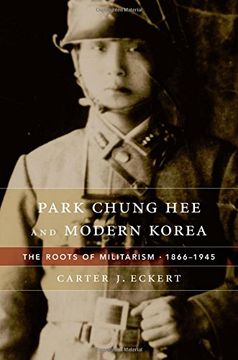Share
Park Chung Hee and Modern Korea: The Roots of Militarism, 1866 1945
Carter J. Eckert
(Author)
·
Belknap Press
· Hardcover
Park Chung Hee and Modern Korea: The Roots of Militarism, 1866 1945 - Eckert, Carter J.
Choose the list to add your product or create one New List
✓ Product added successfully to the Wishlist.
Go to My Wishlists
Origin: U.S.A.
(Import costs included in the price)
It will be shipped from our warehouse between
Friday, June 28 and
Thursday, July 11.
You will receive it anywhere in United Kingdom between 1 and 3 business days after shipment.
Synopsis "Park Chung Hee and Modern Korea: The Roots of Militarism, 1866 1945"
For South Koreans, the twenty years from the early 1960s to late 1970s were the best and worst of times--a period of unprecedented economic growth and of political oppression that deepened as prosperity spread. In this masterly account, Carter J. Eckert finds the roots of South Korea's dramatic socioeconomic transformation in the country's long history of militarization--a history personified in South Korea's paramount leader, Park Chung Hee.The first volume of a comprehensive two-part history, Park Chung Hee and Modern Korea: The Roots of Militarism, 1866-1945 reveals how the foundations of the dynamic but strongly authoritarian Korean state that emerged under Park were laid during the period of Japanese occupation. As a cadet in the Manchurian Military Academy, Park and his fellow officers absorbed the Imperial Japanese Army's ethos of victory at all costs and absolute obedience to authority. Japanese military culture decisively shaped Korea's postwar generation of military leaders. When Park seized power in an army coup in 1961, he brought this training and mentality to bear on the project of Korean modernization.Korean society under Park exuded a distinctively martial character, Eckert shows. Its hallmarks included the belief that the army should intervene in politics in times of crisis; that a central authority should plan and monitor the country's economic system; that the Korean people's "can do" spirit would allow them to overcome any challenge; and that the state should maintain a strong disciplinary presence in society, reserving the right to use violence to maintain order.
- 0% (0)
- 0% (0)
- 0% (0)
- 0% (0)
- 0% (0)
All books in our catalog are Original.
The book is written in English.
The binding of this edition is Hardcover.
✓ Producto agregado correctamente al carro, Ir a Pagar.

